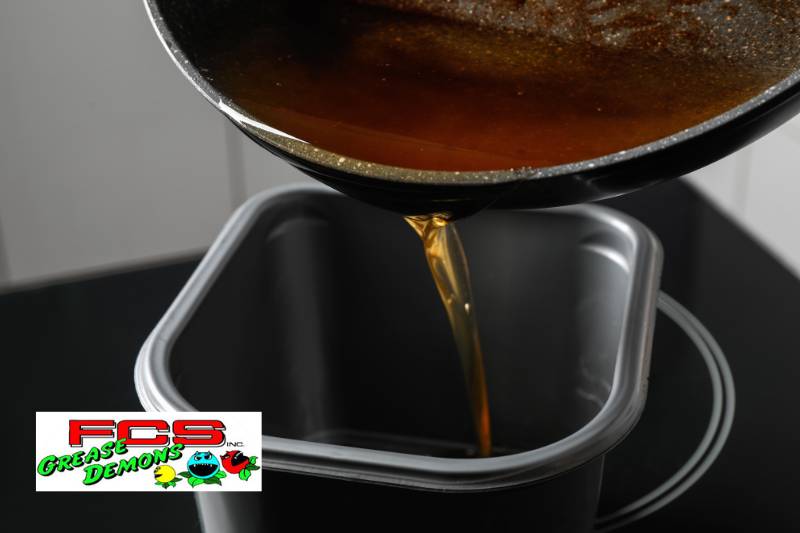How Used Cooking Oil is Recycled: A Sustainable Approach to Waste Management
In recent years, environmental sustainability has become a top priority for businesses and households alike. One area often overlooked is the disposal of used cooking oil. Whether it’s the leftover oil from a commercial kitchen or what’s left after frying at home, improper disposal of cooking oil can have harmful effects on plumbing, local water systems, and the environment. But did you know that used cooking oil can be recycled and turned into useful products?
In this blog, we’ll explore the process of cooking oil recycling and how companies like FCS, Inc. are making it easier for businesses and individuals to contribute to a greener future. We’ll also answer the key question, “How is used cooking oil recycled?” and look at the environmental and economic benefits of doing so.
Why is Recycling Cooking Oil Important?
The improper disposal of used cooking oil can cause a variety of problems. When poured down the drain, it can clog pipes and sewer systems, leading to costly repairs and environmental pollution. Even if it’s thrown away in the trash, cooking oil can seep into the ground and contaminate soil and water supplies. That’s why recycling it instead of throwing it away is a more sustainable solution.
Cooking oil recycling helps to:
- Reduce environmental impact: By recycling used cooking oil, you prevent it from polluting water systems and contributing to environmental degradation.
- Reduce waste: Recycling minimizes the amount of waste sent to landfills, contributing to better overall waste management.
- Create renewable energy: Used cooking oil can be transformed into biodiesel, a renewable energy source that reduces our dependence on fossil fuels.
- Support sustainable business practices: Businesses that recycle their used cooking oil can promote environmental responsibility and align themselves with eco-conscious consumers.
How is Used Cooking Oil Recycled?
Recycling used cooking oil involves several steps, from collection to the final transformation into valuable products like biodiesel. Here’s a detailed look at the process:
1. Collection of Used Cooking Oil
The first step in cooking oil recycling is the collection of used cooking oil from businesses and households. In a commercial setting, such as restaurants or food processing facilities, large amounts of used cooking oil are generated daily. These businesses often partner with specialized companies like FCS, Inc. to handle the disposal and recycling process.
FCS, Inc. provides used cooking oil containers and collection services for businesses, ensuring that oil is stored safely until it can be picked up for recycling. For households, some local municipalities and recycling centers offer drop-off points for cooking oil, where individuals can dispose of small amounts of used oil.
2. Transportation to Recycling Facility
Once the used cooking oil is collected, it is transported to a recycling facility. Companies like FCS, Inc. specialize in ensuring that the oil is handled in a way that minimizes its environmental footprint during transportation and recycling.
In the facility, the used cooking oil goes through a process of filtration and refinement, removing food particles, water, and other contaminants that may have accumulated during cooking. This step is essential to prepare the oil for its next stage of life as a recycled product.
3. Processing and Purification
After collection and transportation, the used cooking oil undergoes processing and purification. The oil is heated to remove any water content and then filtered to eliminate any solid particles, such as bits of food or impurities that have mixed with the oil during cooking.
The filtration and purification process ensures that the oil is clean and ready to be transformed into new products. Without this step, the used cooking oil would not be suitable for conversion into renewable energy or other applications.
4. Conversion to Biodiesel
One of the most common uses for recycled used cooking oil is the production of biodiesel, a clean and renewable alternative to traditional diesel fuel. Biodiesel can be used in vehicles, machinery, and even as heating oil. It has a lower carbon footprint compared to conventional fuels and helps reduce greenhouse gas emissions.
To produce biodiesel, the purified used cooking oil undergoes a chemical process known as transesterification. In this process, the oil is mixed with alcohol (usually methanol) and a catalyst (such as sodium hydroxide) to separate the glycerin from the fatty acids. The result is biodiesel and a byproduct called glycerin, which can be used in soap and other products.
5. Creation of Other Byproducts
In addition to biodiesel, recycled used cooking oil can be transformed into other useful products. For example, it can be used in the production of animal feed, lubricants, soaps, and even cosmetics. By recycling the oil into different products, we reduce the demand for virgin resources and promote a circular economy where waste is repurposed into valuable goods.
Benefits of Cooking Oil Recycling
Recycling used cooking oil offers a range of environmental, economic, and social benefits. Here’s why cooking oil recycling is a responsible choice for both businesses and individuals:
1. Environmental Benefits
By recycling used cooking oil, you help reduce the harmful impact of improper disposal on the environment. When oil is poured down the drain, it can clog sewage systems and cause overflows that pollute waterways. Used cooking oil that ends up in landfills can also contribute to the emission of methane, a potent greenhouse gas.
Recycling the oil helps mitigate these environmental risks while also reducing the demand for fossil fuels. Biodiesel produced from used cooking oil is a cleaner-burning fuel that generates fewer emissions than traditional diesel, making it a more sustainable energy source.
2. Economic Benefits
For businesses, cooking oil recycling can reduce waste management costs and create additional revenue streams. Many companies that collect used cooking oil, like FCS, Inc., offer rebates or compensation for large volumes of oil, providing an incentive for businesses to adopt sustainable practices.
In addition, the production of biodiesel from recycled cooking oil helps reduce our reliance on petroleum-based fuels, contributing to a more resilient and diverse energy market.
3. Social Responsibility
Businesses that recycle their used cooking oil are seen as environmentally responsible, which can enhance their reputation among customers who value sustainability. In today’s eco-conscious market, demonstrating a commitment to recycling and waste reduction can set businesses apart from competitors.
For individuals, cooking oil recycling is a small but impactful way to reduce household waste and contribute to environmental protection. Many communities now offer resources to help residents dispose of and recycle their used cooking oil properly.
How FCS, Inc. Supports Sustainable Cooking Oil Recycling
At FCS, Inc., we are committed to providing comprehensive cooking oil recycling services that make it easy for businesses to dispose of their used cooking oil responsibly. Our collection and recycling services ensure that your used cooking oil is safely transported, processed, and converted into renewable energy or other valuable products.
We work with restaurants, food service providers, and other businesses to create customized solutions for cooking oil disposal, helping to reduce environmental impact and support sustainability goals. By partnering with FCS, Inc., you can take a proactive approach to waste management and play a part in promoting a greener future.
Contact FCS, Inc for grease trap cleaning and maintenance
Recycling used cooking oil is a simple yet effective way to reduce environmental harm, minimize waste, and create renewable energy. Whether you’re a business or an individual, cooking oil recycling helps protect water systems, reduce carbon emissions, and support a more sustainable economy.
At FCS, Inc., we’re proud to offer eco-friendly solutions for cooking oil disposal and recycling. By choosing to recycle your used cooking oil, you’re not only doing your part to protect the planet—you’re also helping to create valuable products that benefit the economy and society as a whole.

